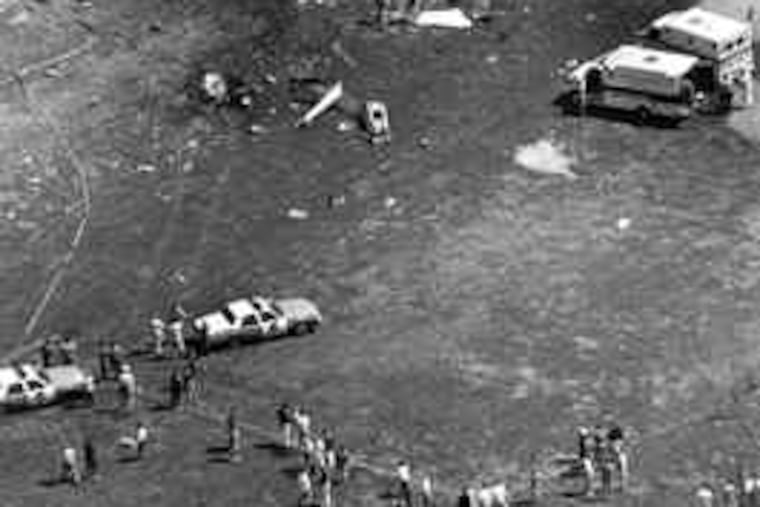Led school through trauma
Marvin Gold, 83, the principal who guided Merion Elementary School through tragedy when U.S. Sen. John Heinz and six others died in a plane crash there in 1991, died of cancer Thursday, April 15, at his home in Haverford.

Marvin Gold, 83, the principal who guided Merion Elementary School through tragedy when U.S. Sen. John Heinz and six others died in a plane crash there in 1991, died of cancer Thursday, April 15, at his home in Haverford.
A Sun Co. helicopter and a small private Piper Aerostar carrying Heinz (R., Pa.) collided over the school on April 4, 1991, killing Heinz, four pilots, and two 6-year-olds on the playground - Rachel Blum and Lauren Freundlich - and severely burning student David Rutenberg, 8.
After a memorial service at the school on April 3, 1992, Dr. Gold told an Inquirer reporter, the passage of a "year has not erased" the tragedy, "but this was closure for us."
"I explained to the children at the beginning that I wanted us all to remember the little girls we lost, but also to be grateful that there's a boy still with us who is running around being a part of our third grade."
Dr. Gold then took a sabbatical in the 1992-93 school year.
He began his career with the Lower Merion School District as a sixth-grade teacher at Belmont Hills Elementary School in 1964, became principal at Merion in 1970, and retired in 1996, said Linda Weinstein, a friend who said she was speaking for the family.
Dr. Gold was known for his school's accomplishments, well before the tragedy.
At the end of the 1985-86 school year, Merion was among eight Pennsylvania schools and 210 nationwide to be honored by the first National Elementary School Recognition Program. Evaluators from the U.S. Department of Education visited the schools to make the selections.
In the fall of 1971, a year after Dr. Gold became principal, Merion Elementary converted to what was termed "open classroom" education. A 1972 article in the Sunday magazine of The Inquirer reported it this way:
"The traditional symmetrically seated classroom - with a single teacher firmly in control dealing out uniform lesson plans at the head of the class - is replaced by an open space where children flow freely and at will, from group to group, teacher to teacher, pursuing projects of their choice."
In 1987, the Lower Merion school board hired an architect to redesign the school.
"We have been moving away from the open-school concept in the last five to six years," Dr. Gold said an Inquirer interview. "The trend in the country is a back-to-basics program, so we have a lot of large spaces that have to have some reconstruction."
The 1987 need, he said, was for permanent walls, sound barriers, and defined teaching spaces so one teacher could deal with one classroom.
"The open school was a very stimulating kind of experience," he said, but "it was in its heyday in the 1970s."
Dr. Gold's article "Evolution, Development & Analysis of Open Education at Merion Elementary School (1970-1975)" was published in Instructor magazine, said Weinstein, the family friend.
Dr. Gold was born in Philadelphia, graduated from Central High School in 1943, and earned his bachelor's degree in 1947, his master's in education in 1964, and his doctorate in education in 1975, all at Temple University, Weinstein said.
In the Army from 1950 to 1952, he served in West Germany.
When he retired in 1996, an Inquirer reporter wrote that "his career took him from Camden, where he sold furniture for his family's business, to Cherry Hill, where he crammed on weekends to keep a few chapters ahead of his first students" at the former Erlton School before going on to Lower Merion.
Dr. Gold is survived by his wife, Carol; a son, Jason; a daughter, Heidi; a stepson, David Shapiro; a stepdaughter, Jane Nadelson; a brother; and five grandchildren.
Services are private.